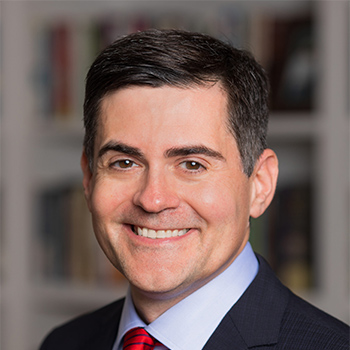Back to series




How Can We Have Narnian Faith in a Screwtape World?
VOLUME 3 NUMBER 1 ISSUE OF BROADCAST TALKS (PDF)
BROADCAST TALKS presents ideas to cultivate Christ-like thinking and living. Each issue features a transcription of a talk presented at an event of The C. S. Lewis Institute. The following is adapted from a talk given by Russell Moore at the C.S. Lewis Institute’s Annual Fundraising Banquet, Narnian Faith in a Screwtape World, held on April 20, 2017, at the Fairview Park Marriott in Falls Church, Virginia.
I heard a commencement speaker not long ago define success as eventually being able to face your eighteen- year-old, past-self who would not be disappointed in you and how you turned out. I actually don’t think that’s a very good definition of success, depending on how mature one was at the age of eighteen. But in my own life, I find that I define success as being able to face my fifteen-year- old, past-self with gospel credibility.
 That’s because at the age of fifteen my life was upended. I was living in a Christian environment, very culturally Christian; everyone I knew was a member of a church. But there came a point at which I wondered whether Christianity was simply an appendage to southern culture or whether Christianity was really about a political agenda or an economic agenda or about keeping people behaviorally in line.
That’s because at the age of fifteen my life was upended. I was living in a Christian environment, very culturally Christian; everyone I knew was a member of a church. But there came a point at which I wondered whether Christianity was simply an appendage to southern culture or whether Christianity was really about a political agenda or an economic agenda or about keeping people behaviorally in line.
That was especially true when I would look around and see such a huge division between the sorts of ideals that some of the people in my culture talked about and the sorts of things they tolerated and lived with and practiced in their own homes and communities. And that was especially true when at that point in the late 1980s there was a rash of evangelical speculation about Bible prophecy, tying biblical passages to current events, seeing supermarket scanners as the Mark of the Beast of Revelation 13, Gog and Magog as the Soviet Union till the Soviet Union fell and became various other nations and groups. I noticed that when these prophecies didn’t come true the people who had been selling products, arguing that these were the fulfillment of those prophecies, didn’t go away. They didn’t apologize; they just continued on with the next prophetic fulfillment in marketing things to us.
I grew really cynical and actually became depressed and alarmed. But thankfully I had read The Lion, the Witch and the Wardrobe as a small child. So I recognized the name C.S. Lewis on the spine of a book in a bookstore. I pulled out Mere Christianity and was transformed by that. Richard John Neuhaus, a generation ago, talked about his conversion to Catholicism as “How I Became the Catholic That I Was.” In many ways I would say that Mere Christianity enabled me to become the Baptist that I was. And the reason for that is because this long-dead-by-then Anglican, speaking to this confused, alarmed, fifteen-year-old Southern Baptist spoke with a kind of credibility that came with an obvious lack of regard for selling me anything. There was obviously, in the voice of this person, someone who through the written word was simply bearing witness to something that he had seen, that the Church had carried down for two thousand years, and it saved my life.
I think several aspects of Lewis’s ministry are especially crucial for our day right now. I’ve been asked to talk about Narnian faith in a Screwtape world, and I think that is exactly the sort of situation that we find ourselves in. I’d like for us to think about two aspects of that.
Gospel Imagination
 The first is gospel imagination. The situation that I was in as a fifteen-year-old is one that Lewis well understood. He talks and writes about this in several places. One is in The Screwtape Letters, a book that Lewis writes from the perspective of a senior demon giving advice to a junior demon. The senior demon advises:
The first is gospel imagination. The situation that I was in as a fifteen-year-old is one that Lewis well understood. He talks and writes about this in several places. One is in The Screwtape Letters, a book that Lewis writes from the perspective of a senior demon giving advice to a junior demon. The senior demon advises:
[Whatever the Christian who is being tempted adopts], your main task will be the same. Let him begin by treating the Patriotism or the Pacifism as a part of his religion. Then let him, under the influence of partisan spirit, come to regard it as the most important part. Then quietly and gradually nurse him on to the stage at which the religion becomes merely part of the ‘cause’, in which Christianity is valued chiefly because of the excellent arguments it can produce in favour of the British war-effort or of Pacifism. The attitude which you want to guard against is that in which temporal affairs are treated primarily as material for obedience. Once you have made the World an end, and faith a means, you have almost won your man, and it makes very little difference what kind of worldly end he is pursuing. Provided that meetings, pamphlets, policies, movements, causes, and crusades, matter more to him than prayers and sacraments and charity, he is ours—and the more ‘religious’ (on those terms) the more securely ours. I could show you a pretty cageful down here.
This is what in the 1920s the Presbyterian theologian J. Gresham Machen called Liberalism, not speaking, of course, of the political categories with which we often use the word, but with the idea of Christianity as a means to an end, Christianity as a tool. Lewis recognized that, and so must we. That’s why I’m glad that in my own life’s journey I started with Narnia before I came to Mere Christianity. I needed to find myself embedded in this story before I could really take in the arguments that Lewis was making. And as we think about what Lewis is doing in The Chronicles of Narnia, it wasn’t the characters there. As the other Inklings knew, Narnia really wasn’t a myth as carefully constructed as, say, Middle Earth was. But my experience with Narnia was similar to that of science fiction and fantasy author Neil Gaiman, who said: “The weird thing about the Narnia books for me was that they mostly seemed true.” They seemed to be reports from a real place. There was a weightiness here, and there was in fact a familiarity there. That was not by accident. Lewis intended this; as he put it, talking about why he was constructing this world, he talked about the sense of disdain that comes with an overfamiliarity with the Word of God, with the great doctrines of the creeds of the faith. Lewis says:
But supposing that by casting all these things into an imaginary world, stripping them of their stained-glass and Sunday school associations, one could make them for the first time appear in their real potency? Could one not thus steal past those watchful dragons? I thought one could.
Certainly he did, at least in the case of many of us in this room. What Lewis was able to do with an imaginative world is what the prophet Nathan did with King David. Not to immediately and directly call him on the adultery with Bathsheba, but to begin by engaging the imagination, by engaging the conscience in a way that would steal past that watchful dragon of a guilty conscience.
You and I are living in a culture right now that’s filled with a different set of watchful dragons than, at least American culture, has known for some time. We’re living in a secularizing age that causes many Christians to respond with bewilderment or with fear or with panic or with outrage. None of that should be the case. We are the people who have been given the charge to appeal to the kind of longing embedded in every human heart that Lewis talked about as joy. He talks about that sense of nostalgia, that sense of longing for the future, that sense of autumn, as he puts it in one place, that sense of northernness as he puts it in another place. That is embedded in all the consciences and hearts of our neighbors, as is a sense of justice, a sense of a longing for a world in which there is justice. You think of, for instance, the movie Spotlight, which addressed the pedophilia scandal within an institutionalized church. There is a sense in which even the most secular people can recognize that a cover-up of an evil that awful demands justice. And as a matter of fact, demands an even greater justice than what we can muster up in our context and in our laws.
 Lewis recognized that, and that’s why Lewis spends a lot of time talking about human uniqueness, a uniqueness that he says shows up in something as simple as ghost stories. He says we’re afraid of ghost stories; we have a sense of the uncanny and of the supernatural, and why. He says that one might say that “we dislike corpses because we are afraid of ghosts,” but “(y)ou might say with equal truth that we fear ghosts because we dislike corpses — for the ghost owes much of its horror to the associated ideas of pallor, decay, coffins, shrouds, and worms.”
Lewis recognized that, and that’s why Lewis spends a lot of time talking about human uniqueness, a uniqueness that he says shows up in something as simple as ghost stories. He says we’re afraid of ghost stories; we have a sense of the uncanny and of the supernatural, and why. He says that one might say that “we dislike corpses because we are afraid of ghosts,” but “(y)ou might say with equal truth that we fear ghosts because we dislike corpses — for the ghost owes much of its horror to the associated ideas of pallor, decay, coffins, shrouds, and worms.”
What Lewis is getting at is exactly what the author of Hebrews is talking about in Hebrews 2, in which he talks about the slavery that comes with a fear of death. We see the fear of death all around us, and we see exactly what Blaise Pascal warned us of, of the running toward diversions to occupy the mind from the fear of death.
We have an opportunity to speak to that sense of eternality, to that sense of human uniqueness in a way that the age actually demands. As Wendell Berry puts it, “It is easy for me to imagine that the next great division of the world will be between people who wish to live as creatures and people who wish to live as machines.” We live in a time when artificial intelligence and transhumanism speak of moving humanity even beyond the limits of humanity itself, and at the same time often reducing humanity to simply data enlivening meat. We are the people who have the opportunity to speak to a vision of humanity that is on the one hand more limited, bound by creatureliness, and on the other hand unbound from the mere mortality of biological processes around us. We can speak by engaging the imagination, by engaging the conscience of longings and fears and warnings that are already embedded in the heart. We can speak to what Frederick Buechner talked about in his epiphany when he says that he believes in God because he was writing novels; he recognizes that as he was writing novels he’d gotten into the habit of looking for plots. And then Buechner said, “After awhile, I began to suspect that my own life had a plot. And after awhile more, I began to suspect that life itself has a plot.”
Life itself has a plot. Individual lives have plots. We have the ability to speak to an imagination with a Christian world that has been given to us in Holy Scripture in a way that is needed in this age.
Spiritual Warfare
But, second, it’s not just gospel imagination. It’s also spiritual warfare—language that becomes really uncomfortable for some Christians, because they assume that spiritual warfare is what is talked about only by the Pentecostal wing of the Christian church, when in reality we are all small-p pentecostal Christians. We are the products of Pentecost, and we are all called to understand the spiritual warfare around us.
N.T. Wright criticizes C.S. Lewis as being too platonic, says he doesn’t emphasize the kingdom of God. Wright gives him a pass on that because in the middle of the twentieth century not many people were seeing and recognizing the kingdom of God. I disagree with N.T. Wright on this; although Lewis doesn’t speak explicitly with the language of the kingdom, he hits repeatedly on the major aspects of the kingdom of God, the summing up of all things in Christ and the ongoing warfare against the principalities and powers that shows up in the arena of history and also shows up in the arena of each human life. He’s emphasizing here exactly what Christian theologians would talk about as the already and the not-yet, of the inbreaking of the kingdom of God. So when Lewis says “enemy-occupied” territory, that’s what this world is. He’s speaking to the sense that we all must have that something has gone terribly awry, something is wrong. He’s getting at what the poet Czeslaw Milosz means when he says, “Whoever considers as normal the order of things in which the strong triumph, and the weak fail, and life ends with death, accepts the devil’s rule.”
 There is a sense in which we see the wreckage of Eden all around us, when we see injustice and pain all around us. There is something within us that causes us to ask: How will this all be put back together? How will this all be made right? And it gives us the opportunity to return to the stone table. It gives us the opportunity to speak of a sacrificial, sin-bearing offering that ultimately defeats the injustice all around us and defeats the injustice within us. We speak of a combatting of the forces around us not with raw force, not with raw sovereignty, not with influence the way the world defines influence, but with something else, with good news that is able to turn this back. And as we speak, both of the joy of the imagination fueled by the good news and of the pain and the suffering and the grief that come with living in enemy-occupied territory, our audience is not just in discipling our fellow Christians, our audience is not just in evangelizing unbelievers around us; our audience must also be future Christians, to prepare them for the task of cross-bearing, people who might overhear us through the witness of those who overheard us, names and faces that we may not even recognize or know in this life. We are speaking a word that’s challenging us to go further up and further in, in a way that’s challenging the next generation to answer new questions in new ways from old wells, walking in old paths.
There is a sense in which we see the wreckage of Eden all around us, when we see injustice and pain all around us. There is something within us that causes us to ask: How will this all be put back together? How will this all be made right? And it gives us the opportunity to return to the stone table. It gives us the opportunity to speak of a sacrificial, sin-bearing offering that ultimately defeats the injustice all around us and defeats the injustice within us. We speak of a combatting of the forces around us not with raw force, not with raw sovereignty, not with influence the way the world defines influence, but with something else, with good news that is able to turn this back. And as we speak, both of the joy of the imagination fueled by the good news and of the pain and the suffering and the grief that come with living in enemy-occupied territory, our audience is not just in discipling our fellow Christians, our audience is not just in evangelizing unbelievers around us; our audience must also be future Christians, to prepare them for the task of cross-bearing, people who might overhear us through the witness of those who overheard us, names and faces that we may not even recognize or know in this life. We are speaking a word that’s challenging us to go further up and further in, in a way that’s challenging the next generation to answer new questions in new ways from old wells, walking in old paths.
What we have to keep in mind is the kind of Christian witness that is not fearful of refutation of the world around us, a Christian witness that is willing to be instinctive, is willing to be marginalized, is willing to be thought strange, and sometimes even to be thought dangerous, in order to speak a word to the fifteen-year-old boys and girls who are wondering if Christianity is really just an opiate for the people, if Christianity is just a tool for the politicians or if Christianity is a word from God. A Christianity that can address a world like that cannot rely on the culture outside to do the pre-evangelism of values for us. A Christianity like that cannot count on the culture around us to make church attendance and Christian identity something that is normative. A Christianity that can address a world like that must be the kind of Christianity that recognizes enemy-occupied territory, that recognizes the gradual pull of Screwtape, a Christianity that also speaks to the longing of escaping from enemy-occupied territory through a wardrobe into something else and something better.
That will take courage; that will take conviction; that will take a level of discipleship that is more intensive than that to which we’ve become accustomed, a discipleship that is willing to prepare children from the ages of two- and three-years-old, perhaps even to be martyrs as they go out into the world. But it’s a Christianity that is able to speak to the heart, a Christianity that is able to speak to the mind, and a Christianity that is able to prepare Narnian Christians in a Screwtape age.


Russell Moore
Ethicist Russell Moore, Ethicist, is Christianity Today's editor in chief and the director of the Public Theology Project. An ordained Baptist minister, Russell served previously as President of the Ethics & Religious Liberty Commission of the Southern Baptist Convention from 2013 to 2021. Prior to that role, Moore served as provost and dean of Southern Baptist Theological Seminary where he also taught theology and ethics. Moore was a Fellow at the University of Chicago’s Institute of Politics and currently serves on the board of the Becket Law and as a Senior Fellow with the Trinity Forum in Washington, D.C. He is the author of several books including his most recent work Losing Our Religion: An Altar Call for Evangelical America.
 COPYRIGHT: This publication is published by C.S. Lewis Institute; 8001 Braddock Road, Suite 301; Springfield, VA 22151. Portions of the publication may be reproduced for noncommercial, local church or ministry use without prior permission. Electronic copies of the PDF files may be duplicated and transmitted via e-mail for personal and church use. Articles may not be modified without prior written permission of the Institute. For questions, contact the Institute: 703.914.5602 or email us.
COPYRIGHT: This publication is published by C.S. Lewis Institute; 8001 Braddock Road, Suite 301; Springfield, VA 22151. Portions of the publication may be reproduced for noncommercial, local church or ministry use without prior permission. Electronic copies of the PDF files may be duplicated and transmitted via e-mail for personal and church use. Articles may not be modified without prior written permission of the Institute. For questions, contact the Institute: 703.914.5602 or email us.
-
Recent Podcasts
Ralph Waldo Emerson’s Philosophy and Influence
by David George Moore on July 26, 2024Ralph Waldo Emerson was a gifted nineteenth century...Read More
-
The Side B Stories – Nate Sala’s Story
by Jana Harmon, Nate Sala on July 19, 2024
-
Terrorism Through the Eyes of Faith
by Dennis Hollinger on July 12, 2024
-
Recent Publications
Hasn’t Science Proven That Belief in God Is an Outdated Superstition?
by Sharon Dirckx on July 1, 2024Many assume that scientific practice and belief in...Read More
-
Has the Bible Been Corrupted as Some Muslims Claim?
by Andy Bannister on June 1, 2024
-
Seeing Jesus Through the Eyes of Women
by Rebecca McLaughlin on May 15, 2024
0
All Booked
0.00
All Booked
0.00
All Booked
22194
C.S. Lewis’s The Abolition of Man Live Online Small Group 8:00 PM ET
https://www.cslewisinstitute.org/?event=c-s-lewiss-the-abolition-of-man-study-course&event_date=2024-10-02®=1
https://www.paypal.com/cgi-bin/webscr
2024-10-02

Next coming event
Days
Hours
Minutes
Seconds
C.S. Lewis’s The Abolition of Man Live Online Small Group 8:00 PM ET
On October 2, 2024 at 8:00 pmCategories
Speakers

Russell Moore
Ethicist
Team Members

Russell Moore
EthicistRussell Moore, Ethicist, is Christianity Today's editor in chief and the director of the Public Theology Project. An ordained Baptist minister, Russell served previously as President of the Ethics & Religious Liberty Commission of the Southern Baptist Convention from 2013 to 2021. Prior to that role, Moore served as provost and dean of Southern Baptist Theological Seminary where he also taught theology and ethics. Moore was a Fellow at the University of Chicago’s Institute of Politics and currently serves on the board of the Becket Law and as a Senior Fellow with the Trinity Forum in Washington, D.C. He is the author of several books including his most recent work Losing Our Religion: An Altar Call for Evangelical America.




